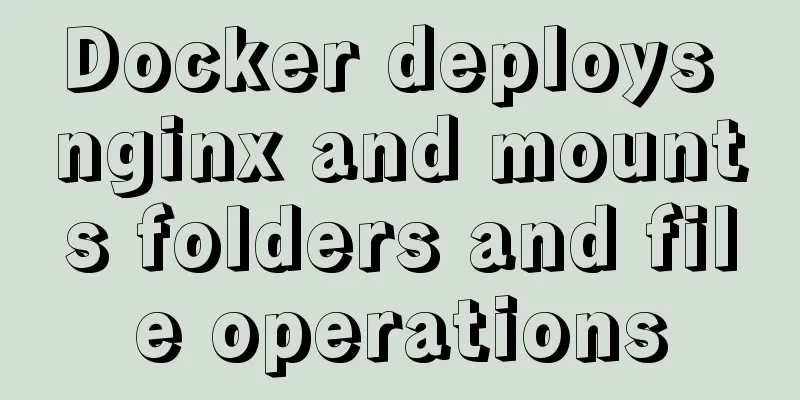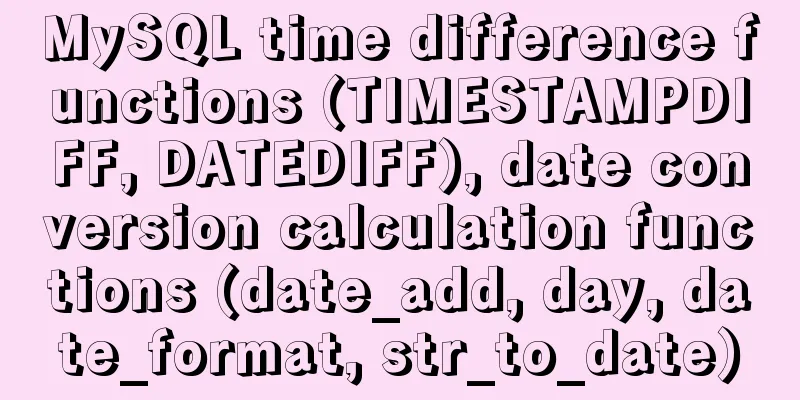Docker deploys nginx and mounts folders and file operations

|
During this period of time, I was studying docker and encountered a pit when deploying nginx. The main problem was that I didn't know how to mount files and folders. After repeated experiments and checking online tutorials, I summarized it as follows: 1First pull download nginx mirror package
2 (Key) Check the specific location of configuration files, logs and other files in the nginx image. Only by finding the path of the image configuration file can the subsequent mounted files and folders cover these paths Open the image container in terminal mode [root@docker2 nginx]# docker run -i -t nginx /bin/bash root@3b39da9212fe:/# ls -l total 8 drwxr-xr-x 2 root root 4096 Apr 26 00:00 bin drwxr-xr-x 2 root root 6 Feb 23 23:23 boot drwxr-xr-x 5 root root 360 May 30 01:39 dev drwxr-xr-x 1 root root 66 May 30 01:39 etc drwxr-xr-x 2 root root 6 Feb 23 23:23 home drwxr-xr-x 1 root root 45 Apr 26 00:00 lib drwxr-xr-x 2 root root 34 Apr 26 00:00 lib64 drwxr-xr-x 2 root root 6 Apr 26 00:00 media drwxr-xr-x 2 root root 6 Apr 26 00:00 mnt drwxr-xr-x 2 root root 6 Apr 26 00:00 opt dr-xr-xr-x 176 root root 0 May 30 01:39 proc drwx------ 2 root root 37 Apr 26 00:00 root drwxr-xr-x 4 root root 43 Apr 26 00:00 run drwxr-xr-x 2 root root 4096 Apr 26 00:00 sbin drwxr-xr-x 2 root root 6 Apr 26 00:00 srv dr-xr-xr-x 13 root root 0 May 25 06:07 sys drwxrwxrwt 1 root root 6 Apr 30 13:55 tmp drwxr-xr-x 1 root root 66 Apr 26 00:00 usr drwxr-xr-x 1 root root 17 Apr 26 00:00 var Find the nginx.conf configuration file path in the image /etc/nginx/nginx.conf root@3b39da9212fe:/etc/nginx# ls -l /etc/nginx/ total 36 drwxr-xr-x 2 root root 26 Apr 30 13:55 conf.d -rw-r--r-- 1 root root 1007 Apr 9 16:01 fastcgi_params -rw-r--r-- 1 root root 2837 Apr 9 16:01 koi-utf -rw-r--r-- 1 root root 2223 Apr 9 16:01 koi-win -rw-r--r-- 1 root root 5170 Apr 9 16:01 mime.types lrwxrwxrwx 1 root root 22 Apr 9 16:01 modules -> /usr/lib/nginx/modules -rw-r--r-- 1 root root 643 Apr 9 16:01 nginx.conf -rw-r--r-- 1 root root 636 Apr 9 16:01 scgi_params -rw-r--r-- 1 root root 664 Apr 9 16:01 uwsgi_params -rw-r--r-- 1 root root 3610 Apr 9 16:01 win-utf Find the path of the default.conf configuration file /etc/nginx/conf.d/default.conf root@3b39da9212fe:/etc# ls -l /etc/nginx/conf.d/ total 4 -rw-r--r-- 1 root root 1093 Apr 9 16:01 default.conf Find the default homepage folder html path /usr/share/nginx/html root@3b39da9212fe:/etc# ls -l /usr/share/nginx/ total 0 drwxr-xr-x 2 root root 40 Apr 30 13:55 html Find the log file path /var/log/nginx ls -l /var/log/ total 96 drwxr-xr-x 1 root root 60 Apr 30 13:55 apt -rw-rw---- 1 root utmp 0 Apr 26 00:00 btmp -rw-r--r-- 1 root root 57602 Apr 30 13:55 dpkg.log -rw-r--r-- 1 root root 3264 Apr 30 13:55 faillog -rw-rw-r-- 1 root utmp 29784 Apr 30 13:55 lastlog drwxr-xr-x 1 root root 41 Apr 30 13:55 nginx -rw-rw-r-- 1 root utmp 0 Apr 26 00:00 wtmp Then enter exit to exit the container terminal 3 Start the mynginx container with the nginx image and mount folders and files into the container Here I explain why I mount configuration files and folders. If you deploy applications and modify nginx configuration files easily, if you mount files or folders, you only need to modify the files in the mount source or folders, instead of using the docker run -i -t nginx /bin/bash command to enter the image terminal to modify the configuration files every time. Below I will demonstrate how to modify my own nginx homepage and mount it in the container to overwrite the original default homepage. Create mount source files and folders in Linux system (mine is centos7) mkdir -p /data/nginx/conf mkdir -p /data/nginx/conf.d mkdir -p /data/nginx/html mkdir -p /data/nginx/logs Then create an nginx.conf configuration file in the conf folder and enter the content. I suggest that you do not copy my configuration. Use the first step I introduced above to enter the terminal of the nginx container and copy the content of the nginx.conf configuration file to the newly created nginx.conf file in the Linux system for modification. This ensures that the path in the configuration file is consistent with the path of the configuration file in the image.
[root@docker2 /]# cd /data/nginx/conf
[root@docker2 conf]# more nginx.conf
user nginx;
worker_processes 1;
error_log /var/log/nginx/error.log warn;
pid /var/run/nginx.pid;
events {
worker_connections 1024;
}
http {
include /etc/nginx/mime.types;
default_type application/octet-stream;
log_format main '$remote_addr - $remote_user [$time_local] "$request" '
'$status $body_bytes_sent "$http_referer" '
'"$http_user_agent" "$http_x_forwarded_for"';
access_log /var/log/nginx/access.log main;
sendfile on;
#tcp_nopush on;
keepalive_timeout 65;
#gzip on;
include /etc/nginx/conf.d/*.conf;
}
Create a default.conf file in conf.d and enter the following content. I also copied and modified this content from the default configuration file default.conf in the image. I also recommend that you do not copy my content, because the paths involved may be inconsistent with the paths in your nginx image. In this way, when starting the image to create a container, you cannot use the mount method to overwrite the path in the container.
[root@docker2 conf]# more /data/nginx/conf.d/default.conf
server {
listen 80;
server_name localhost;
#charset koi8-r;
#access_log /var/log/nginx/host.access.log main;
location / {
root /usr/share/nginx/html;
index1.html;
}
#error_page 404 /404.html;
# redirect server error pages to the static page /50x.html
#
error_page 500 502 503 504 /50x.html;
location = /50x.html {
root /usr/share/nginx/html;
}
# proxy the PHP scripts to Apache listening on 127.0.0.1:80
#
#location ~ \.php$ {
# proxy_pass http://127.0.0.1;
#}
# pass the PHP scripts to FastCGI server listening on 127.0.0.1:9000
#
#location ~ \.php$ {
#root html;
# fastcgi_pass 127.0.0.1:9000;
# fastcgi_index index.php;
# fastcgi_param SCRIPT_FILENAME /scripts$fastcgi_script_name;
#include fastcgi_params;
#}
# deny access to .htaccess files, if Apache's document root
# concurs with nginx's one
#
#location ~ /\.ht {
# deny all;
#}
}
Please note that I have modified the content of the original default configuration file. In one of the locations above, I changed the nginx default homepage index to 1.html. 1.html is the name of the homepage I created myself. Create a 1.html homepage file in the html folder and write your own homepage. Here I used notepadd++ to write the 1.html file on Windows and then copied it to the Linux system through the tool. Note that if there is Chinese, you may need to convert the encoding, otherwise it may be garbled. For example, I use ansi encoding here <html> <head> <title>Mynginx</title> </head> <body> <h1> Welcome to use nginx! </h1> </body> </html> Now it’s time to create the container and mount the files and folders [root@docker2 conf]# docker run --name mynginx -d -p 80:80 -v /data/nginx/html:/usr/share/nginx/html -v /data/nginx/conf/nginx.conf:/etc/nginx/nginx.conf -v /data/nginx/conf.d/default.conf:/etc/nginx/conf.d/default.conf -v /data/nginx/logs:/var/log/nginx nginx Remember to keep the target directory or file path consistent with the path in the image, such as /etc/nginx/nginx.conf, which has been found in the second step. docker ps to see if it is started successfully [root@docker2 conf]# docker ps CONTAINER ID IMAGE COMMAND CREATED STATUS PORTS NAMES 32ad171d34a2 nginx "nginx -g 'daemon of..." 17 hours ago Up 17 hours 0.0.0.0:80->80/tcp mynginx If the startup fails, first use docker ps -a to view the failed container, and use docker rm CONTAILNER ID to delete the container ID, then find the problem, and then use docker run to start the container. If it still cannot be started after ensuring that there are no problems with the mounted directory and files, then it is a permission problem. The Internet says to add the --privileged=true parameter after docker run. Open the web page at http://IP to see the effect.
The above article about docker deploying nginx and mounting folders and file operations is all I have to share with you. I hope it can give you a reference. I also hope that you will support 123WORDPRESS.COM. You may also be interested in:
|
<<: Implementation of whack-a-mole game in JavaScript
>>: Summary of important components of MySQL InnoDB
Recommend
Background image cache under IE6
CSS background image flickering bug in IE6 (backg...
Basic notes on html and css (must read for front-end)
When I first came into contact with HTML, I alway...
Analysis of statement execution order of sql and MySQL
I encountered a problem today: Can I use the as a...
MySQL Optimization: Cache Optimization
I am happy that some bloggers marked my article. ...
MySQL pessimistic locking and optimistic locking implementation
Table of contents Preface Actual Combat 1. No loc...
Apache Flink arbitrary Jar package upload leads to remote code execution vulnerability recurrence problem (vulnerability warning)
Vulnerability Description Apache Flink is an open...
JavaScript web page entry-level development detailed explanation
Part 3: ❤Three ways to overlook backend data rece...
How to set focus on HTML elements
Copy code The code is as follows: <body <fo...
Detailed explanation of docker entrypoint file
When writing a Dockerfile, include an entrypoint ...
Vue multi-page configuration details
Table of contents 1. The difference between multi...
Summary of SQL deduplication methods
When using SQL to extract data, we often encounte...
How many times will multiple setStates in React be called?
Table of contents 1. Two setState, how many times...
Linux command line operation Baidu cloud upload and download files
Table of contents 0. Background 1. Installation 2...
Analysis of mysql temporary table usage [query results can be stored in temporary tables]
This article uses an example to illustrate the us...
base target="" specifies the target of the base link to open the frame
<base target=_blank> changes the target fram...










